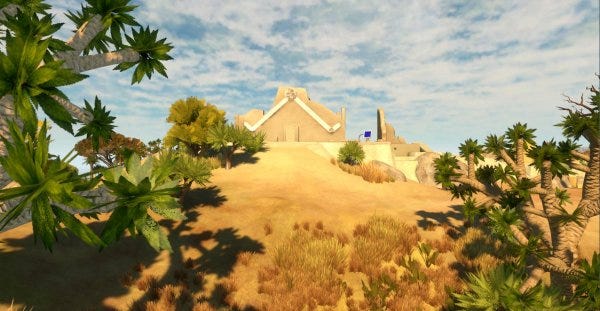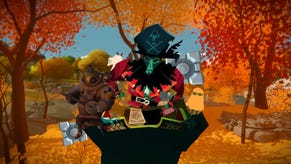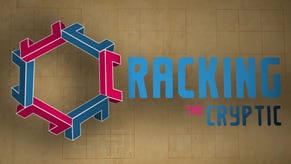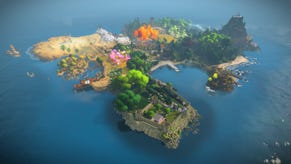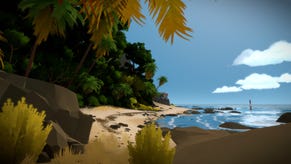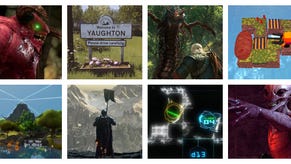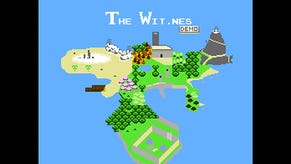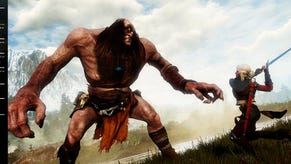Coming to Blow’s: The Witness Interview
Jonathan Blow Talks Games, Books, Shadows
Meanwhile, across the Atlantic, Master Jonathan Blow has achieved unexpected fame and fortune through the creation of a logistical contrivance called Braid. Glad of this success, he has travelled far from his native San Francisco to take lodgings in riotous London's Clerkenwell district, so that he might demonstrate his his newest invention - rudely entitled "The Witness" - to the skeptical souls of the old world, including Mister Griliopoulos, unexpectedly standing in for Professor Rossignol. We join the interview at the point where the auteur is struggling with the thinking device hosting his daemonic design.
Now do read on...
RPS: Wait, was that file called Rocket Launcher?
Blow: Well, we haven't deleted all those files yet. There's an animation of him pulling out the rocket launcher, and we haven't done any other animations yet. We might need one to, like, test the data format.
RPS: Or in case you want to destroy everything, you just pull the space marine back out.
Blow: I want to destroy everything to do with this laptop right now. It's... (looks at files copying slowly) 3 hours and 15 minutes remaining.
RPS: So, Jonathan, tell me again, why are you developing solely for PC?
Blow: Well, most of the time it's great, just occasionally... (stares at copying files again and talks really quickly) half of these files are not really necessary, because they're source-control files but if I do the export process to get rid of them, I'll be also getting rid of stuff that's not checked in that's preprocessed that we need that's... this is where it all gets mad. (Jonathan starts cursing Winzip, which is jumping between several days and a couple of minutes to zip up a new build.)
RPS: It's not like Microsoft have thousands of people working on making their user interface better or anything. I have a copy of Fable 3 on GFWL which took three days to download, then wouldn't install, so I never played it.
Blow: Microsoft has this weird idea that what people who play PC games want is more restrictions on being able to install and launch the game. I knew someone who went there to work in their group and they were like “what we need is more parental controls.” You think that, maybe there are some people who want that, but there are also some bigger issues that they could be working on... Windows 8 is going to be like a phone. The UI in Windows now is so full of so much unnecessary stuff that it might nice to just toss it out and redo it but I don't necessarily have faith that copying a phone UI is the way to do that.

RPS: I just want to turn off all these shaders and transparencies and turn Windows back to 3.1.1. The games would be so fast!
Blow: You hear this from so many developers, but PCs are really crazy fast now, compared to consoles, utterly ridiculous how much faster they are. But DirectX kinda gets in the way. On the 360 DirectX is just basically a way of organising what you're going to do; here it has to deal with all these crazy things that are happening, and it's very slow as a result.
RPS: Would doing what Sony does each generation, almost starting from very basic levels on the system and architecture, help with Windows?
Blow: I don't know that starting from scratch would help with that, unless you threw all of Windows away. You could “very easily” have a modern PC that ran games much faster for exactly the same hardware, with minor changes to the architecture, same hardware, same level of operating system, but that's not what we've historically had. But it could also be a lot worse than what we have, so we've kind of done okay. (looks at slow-moving bar on screen. Curses Winzip some more.) You know, a 2D game would not be this bulky and hard to move around.
RPS: You should have stuck with Braid.
Blow: Braid 2. People told me I should have done that. Now I know!
RPS: Well, let's assume I've seen a putative game called The Witness, perhaps I've experienced directly through intuition accessing one of Plato's forms floating in the ether. Would I have enjoyed it?
Blow: Speaking statistically almost everybody who's played it on this trip has enjoyed it... one guy seemed to really hate it. Given how strange of a game it is, the statistics are actually... good. I think he just really didn't like puzzle games.
(Suddenly, the game starts working. Dan plays the game for two hours until his head really hurts, while Jonathan hides in his bedroom.)
RPS: Tell me about the lasers you get from completing some puzzles.
Blow: Every time you turn on one of these on, and there's seven, they all antenna back to this thing, on the highest point on the island. You can see there's a force-field, like at the beginning, and there's a counter, so you got one out of five, not seven. You see, there's some puzzles that people can't do; so if you're deaf, you can't do the audio puzzles that you were just playing. It seems stupid to put in text captions like, "here are the notes being played" because there's no puzzle any more. You can't even adapt it, it just no longer works.
RPS: I guess for a disabled person, you might give them the option at the beginning to lock out any puzzles they can't do.
Blow: Even if it's somebody who isn't deaf, it's okay with me that there's something that they can't figure out. The mentality behind the design is much less controlling of the experience and when you give people freedom, one of the things you end up giving them is the freedom to not have the best time, sometimes. Where AAA games has gone is to get super focus-tested to make sure that people always have the most fun. That inevitability ends up with a very controlling kind of thing.
RPS: You don't want to hold people's hands; even Half-Life 2 Episode 2 did that thing where they tracked the points where people were dying and eroded the difficulty spikes through patches.
Blow: In a game like Half-Life 2, that is a good thing. If a game is too hard, then people can't play the rest of the game and that's terrible. Because what I'm trying to do is non-linear, it can withstand that kind of thing; if there's a puzzle that's too difficult and 70% of players don't get it... it's o-kay. I'd rather have it, to be able to go to that depth or height or whatever. Cuz otherwise you're saying a good video game is one that doesn't alienate players and is linear and these things, then you're saying that games can't do puzzles of a certain complexity. Which I think is a shame. I miss puzzle games that have real puzzles in them.
RPS: Have you played SpaceChem? That was one game I was happy to be properly challenged by.
Blow: Yes. It's a really nice game, I do take issue with the interface; you can imagine it being a lot more streamlined and it would be a lot nicer.
RPS: Certain puzzles in The Witness, when you failed them, dropped you back to the previous puzzle.
Blow: It's up in the air how much I'm going to use that. Some puzzles use it, a lot of them don't and there's no visual indicator whether they will. It was to prevent guessing. One of the problems of non-linearity is that people can go anywhere, so it's important to establish at the beginning that this is not a game about guessing the answer but about really knowing it. It is a little bit frustrating.
RPS: Almost every element of the rich landscape feels like I should at some point pay attention to, so it's extremely intense as an experience. I was getting a mild headache from trying to absorb all these stimuli and filter out the key one that's different.
Blow: That's interesting, because you went to very unusual places on your playthrough. I don't know what that says about your gameplay mentality, but the path most people take is a lot more pure puzzle than environmental. Some of the experiences are more in the environment.

RPS: What were the ones I came across that you'd thrown everything in on?
Blow: These are sort of... Boss... puzzles. It incorporates all these concepts. Games have this very traditional thing where you find a key and the key gets you through a door. It's like that here, except that the key is just what you understand. Concepts as keys. Sometimes there are simpler doors; it looks so simple that if you knew what to do, you'd be able to do it very easily; if you don't, you'd just be guessing. The boss puzzles are more about aggregating and making everything more complicated. Once you get in there, there's something you can get which you can use elsewhere.
RPS: The aesthetic with the buildings is halfway to Mirror's Edge, with the bright colours and platonic forms.
Blow: We're going to stay with that in general, but we're going to do a more professional job of building the structures. All the buildings you see right now, even the tower is just too traditional a tower, and that house is just a box, and so on. We just last month started working with some architects to design buildings and also to design terrain, like landscape architects, right? Even the terrain here is just sort of, organically what happened as I built these puzzles and needed to put them somewhere. But it doesn't look natural and from minute to minute, if I'm walking round the beginning of the game, there's a little bit of visual interest, but not as much as you imagine there could be. There's a little hill here, that reveals more of the landscape as you go past it. But you make it like those bumps are part of an actual structure that happens for a geological reason and it makes sense in your brain and...
(Jonathan digs for a bit in his computer and pulls out a brochure detailing the island).
I don't know that we're going to use this but we have this concept. This is the shape the island is now, there's a theory that it was formed volcanically and there are ridges that travel around. We have this timeline of the island, who lived there and when and what happened, and geological formations that you might find. There's been a structural history, so different civilisations have moved in and out, and old structures have been reappropriated. So here, there's a battlement wall, and it's deteriorated and somebody's built a modern home in the courtyard with a cared-for garden.
RPS: Why call it The Witness?
Blow: One of the consequences of where you went was that there weren't many story recordings. So, the idea is that those are threaded through various areas; the hedge maze has four stages, so there might be four recordings and a fifth one at the top. The symmetry area has seven or eight. There's a story there that unfolds over the course of ten hours of play. Because of that, it's a slow-burn story, where you get a general idea that you gradually put together. Because the navigation around the world is non-linear, those are somewhat non-linear. It's hard to explain the title without that, but there is a reason why this island and the puzzle exists and why you're there, and the name has to do with that. Very vague, unfortunately.
RPS: Is the narrator’s voice final?
Blow: He's a temp voice. I don't know who the final actor's going to be, but we're going to have very high quality voice-acting, but also the demeanour of story-telling in the game is going to be really different from what games usually do. Games bearing is usually very presentational and what they're presenting to you is an entertainment story. Here the bearing is more about speaking directly, honestly and straightforwardly as possible. What is being spoken about is not so much an entertainment story... it's really more of a serious story that has a philosophical bent to it. The way if someone writes a novel that we think is good - it's like that.You could have a novel that is my trashy romance that a housewife might read on the airplane...
RPS: ...and this is more Crime & Punishment? What are your dream influences? Godel, Escher, Bach?
Blow: I'm not going to put my game there. There's lots of authors I could tell you I like, but this isn't modelled after that. It's really about me being a little reactionary to the way stories are told in games. Coming up with the story has been the hardest part of the game - the design was easy compared to this. You know, I knew this was going to be a game about philosophical things, so the first version of the story was the narrator talking very directly about philosophical things, which has the potential to be quite bad.
RPS: How bad?
Blow: I don't think it was terrible, but you're in this realm where there's a puzzle you could just be doing and this guy comes on and he's talking about stuff that you're not sure why you should care about. In reaction to that, we went more in the direction of entertainment with the second story, but I felt like that was giving up. It would have been more of a literature type of entertainment story but it was like "hey, aren't you going to know what happened next when these two people had this argument" or whatever. We understood how to do that in games, but it's now talking about ideas in a more engaging way, by having this character of the narrator being very personal and talking only about things that matter for sure to him. He's not talking about abstractions. So it's almost inspired by people telling autobiographical stories, I almost want to say Spaulding Gray (http://en.wikipedia.org/wiki/Spalding_Gray), but it's not like that. There's not a lot of jokes in this games.

RPS: How is it philosophical? I found the Feynman fermentation recording beneath the picnic.
Blow: The core idea behind the game has something to do with the very difficult question of who we are and why we're here. What is it about walking around a world, looking at things and noticing things and being conscious of them? It's a question a lot of people have asked throughout history and for which there are a number of approaches, in the wide sense. You might have a very scientific mindset and say, "all we know about the universe is that which we directly observe", or you might have a philosopher's mindset and base your things on argument... I wouldn't break it into discrete avenues like that; there's some scientific stuff, philosophical stuff, and spiritual and religious stuff, some just straight up pragmatist... and there's this idea that this stuff is the space because the character is trying to figure out what way to go, trying to understand these things better. It's cultivated so that these are only things from people who've taken very serious attempts at understanding the world.
In America we have intelligent designers who want to not keep science in school, because they just don't, because they believe this. That kind of thing doesn't make it's way into this game. In terms of the story stuff, the straight-up audio recordings are the narrator talking about that kind of issue, trying to come to that kind of understanding in the context of his life. The other ones are much more hidden; that one you find is one of the more obvious ones but, just to give you an idea, you probably walked past at least five other ones that were hidden and you really have to be looking for them.
RPS: If I was to be glib, I'd say ‘isn't that a metaphor for the world?’
Blow: Right! And those are quotes from different people, pulled from the real world. Rights acquisition is going to be a huge pain-in-the-ass. So there's this thing of multiple layers; there's puzzles in the panels, in the environment, there's these audio-recordings as a body, but two distinct parts that serve two different functions, and all these things are woven together with other secret stuff that we're not going to talk about. I would like it to be a very complex thing with lots of layers and people can choose how much they want to engage with it. If someone finds one of those recordings during the game, they might be inspired to try and find all of them, to get a wider picture of that part of the game. I'm trying to have that freedom to be possible and result in a higher quality experience no matter which way people approach. We'll see.
RPS: So you have this mesh of rational thinkers behind the game; not necessarily without faith, but logical thinkers.
Blow: I would call it... reality-based. Science is a kind of reality-based thing, but you can have non-scientific reality-based things. They're not just puzzles, they always have some kind of idea behind them and the process of solving the puzzles is about understanding. The ones near the beginning, just in the panel, it's almost just a symbolic or math idea, and it's more obvious how it's like math later, when they combine into these boss puzzles, but like there's um, an investigation that happens. We can put these dots in that you have to run over with your path; but what does that mean? It's a miniature explanation in that domain, but then there's structural correspondance; the reason that this apple tree tells me where to go on this panel is that I perceive these as roughly the same shape, and I happen to see that apple as a special feature. There's not logic there, but it's "I guess that these correspond."
Similarly, you can do the hedge-mazes and in retrospect explain the logic behind it but as one is doing it, it doesn't feel logical. There's a progression where the barrier is first a literal barrier, then it becomes subtler, then it becomes subtler and less tangible, and at the end it's playing with the idea of using this correspondance, so we're going to change the correspondance. There's something about this whole process, which is about different phenomenon. The process of doing all these puzzles is a little observing the things that can happen in a simple world where we don't have a lot of verbs; it's just about moving our viewpoint about and pushing buttons.
RPS: Space Giraffe does the same thing with colour and sounds being important signifiers, but I couldn't play that at all; there was no learning gradient.
Blow: That's one of my favourite games but colourblind people probably have a tremendous difficulty with it. With this, there's no action-element, nobody's going to kill you or a bomb that's going to blow up in five minutes. It's about building that space that's pensive. Having the faith that what's behind the puzzles is interesting enough that we don't have to push the player with an emergency or drama or fight to survive. I like that because it's a mood you don't get very often, especially in games where you're walking around a world. Usually if you're playing a RPG and feel safe, it's because you already killed everyone in the area. To have that be the game, to have it be a placid place, almost a meditative place, or just a calm, subconscious place.
RPS: I was surprised at the lack of Zen gardens. It's amazing the amount of work you put into that background material, just to make it feel like a real environment.
Blow: Zen gardens would have been too obvious. It's just to make it feel like it has a lot behind it. It may be alluded to very occasionally in the recordings, but in a very light way. Most of the facts in that booklet, very few people would ever come to an understanding of those facts, but that's what building a world is about.
RPS: Any books you want to recommend to the RPS literati?
Blow: A lot of physics books. I read a lot of those "year's best science fiction" books; some of those are great, but many of them are not. Some of my favourite recent science fiction authors are better writers than others; my favourite is Ted Chiang; he has a very good collection of short fiction called "Stories Of Your Life and Others" (http://en.wikipedia.org/wiki/Stories_of_Your_Life_and_Others); it was recommended to me after Braid came out, as in the main story he talks about the nature of time and physics and stuff. In the other direction, there's someone like Greg Egan, whose stories are great, but I can't say much for his writing of characters. I was reading one of these "best of the best" SF collections, about a 1000 pages long and I was thinking 'I really don't like any of these stories." I realised the editor’s criterion for best of the best had to do with prose quality; but even good prose quality amongst SF writers is not that good. If you filter for that, away from the best of the idea-based stuff, then I think you get something that's inherently mediocre. Whereas I think if it had been "the best of visionary ideas", I would have enjoyed it more.
RPS: Yes, my favourite SF author is Philip K Dick; the man has amazing, strange ideas, but can't do characters or dialogue. His pseudo-autobiography Valis is almost intolerable, with the pink laser-beams from space beaming information into his mind.
Blow: That's the only book of his I've ever read. I got it exactly because it's 'That Book'. But he's being very serious about it, very straightforward. That's the kind of story-writing that's in this game, although not pink laser beams. I get the impression he's being honest. I get the impression he's like "I know this all looks completely crazy, but I've seen these things and I believe them therefore I'm going to tell you. You will think that I'm crazy, that's fine." How many people would do that? I was entertained by the book.

RPS: And he believed there was no time between AD37 and the 1970s, and that he was an amnesiac Roman centurion. Anyway I'm rambling about books now.
Blow: That's totally appropriate. Apart from the narrative style in the island, which is booklike in terms of bearing, there's a different thing that's interesting. A minute ago I was saying all these puzzles have these things behind them which relate to the world, but a by-product of that is that they all have ideas in them. There's 300+; I just got ideas for five more yesterday, which I have to put in, extensions of what's already there. The fact that there are that many individual ideas, as you play through the full game, makes it feel very different from most games. I mean, ten hours is a long time, right? Maybe not by the standards of JRPGs, but...
RPS: ...that's not individually generated content though.
Blow: Here every single puzzle has the element of an individual idea. And after it's all finished you could look at it and have an understanding of what the sequence was. There's something about a flow of ideas that starts and goes places and keeps refining and evolving and ends up somewhere, even if it's not linear, that seems more literary. In something like Do Androids Dream of Electric Sheep, which I haven't read but I've seen the film, you start with a conceit, possibly several, and you ask "what happens in this situation" and every one of those questions has an answer that's interesting. I don't feel like we do that kind of thing in games yet; this sort of ended up there accidentally, where there's this flow of ideas all the time. I kinda like it, now that the game's designed, but I'm not going to pretend that I planned that. As opposed to a third-person fighting game, where there are ideas that happen and, even as far as the middle of the game you're getting new moves and stuff, but they're not that big of an idea. In general you learn something and there's a lot of fighting in between new experiences. It's not every done where the focus is the ideas, and here it is because there's nothing else. I like the way that's coming up.
RPS: It's rare to find a game that breaks new ideas with each step. Is this going to be on PC, 360, PS3?
Blow: The only platform I know for sure is PC. Other platforms, I'd like to do at least one console but it's a lot of effort. It's an open-world game with no loading where you wander around, so even those it's small it's not going to fit remotely in memory on one of those consoles. On a console, we have to start doing all this engine stuff, like Skyrim has to do, streaming in assets, which is a lot of work. The CPU's really slow, the shader's really slow... it's very difficult for me to believe that we'll be able to deliver the experience we want people to have on a 360. With a small team size. If I was Rockstar and could put a 100 programmers on it, we could do a great job; we're good programmers but there's only so much you can do in a year, five years. The 360 would be done and we'd be on the next console before we could all this stuff done. In that light, PC for sure. It will be the definitive version of the game. It's going to have the highest end machinery out of everything and it's gonna be the version we able to update and fix. I'd like to do iOS; iPad 2 is quite a capable machine. You play Infinity Blade on there, it's really not bad; this is much more demanding, because open environments are just more demanding. They may announce iPad 3 in a couple of months, which will have some kind of spec boost, so by the time this game comes out we'll be talking iPad 4, which may well be faster than an Xbox 360, for all I know.
RPS: iPad 2 has the same memory as the 360, right?
Blow: Yep, 512MB. Except that on the iPad you know you have access to fast storage you can page in from. If you're packaged for download on XBLA, that's really slow. If I'm thinking about what's the most technically easy second platform, it's iPad or maybe Wii-U. I don't have faith that the Wii-U's going to have a store that anyone's going to buy anything on. So should I do retail? So I just say PC right now. I can do that because we're self-funded and there's no publisher saying we have to have all this lined up; if there were, we'd be rushing the game through and it would be all buggy and terrible.
PC games are doing great lately! That's the thing about Steam, all this amazing stuff where indie games are selling like mad. Part of it is just that PCs are so easy to make stuff on now. Also, bigger games abandoning the platform created a vacuum and those people want to play those games. Minecraft is not a high-production value game - if you were to have imagined what is the game that on the PC will say 8 million copies, made by an Indie, what does that look like, I wouldn't have imagined Minecraft.

RPS: In Alpha as well. In retrospect, you can go the 8-bit graphics, the haunting familiar music, the exploration, but a marketing guy would never have gone "let's go out and make a game like this!"
Blow: Player creativity. Play with your friends. All that is PC kind-of stuff. It makes sense now. What it makes clear to me is that whatever we think are the rules of what we have to do, it's an incomplete picture.
RPS: Also, PC developers can still charge more than 59p / 99c, unlike mobile.
Blow: iPad has a better price point. It's really interesting because the space is changing so quickly. That's why I'm not into signing deals right now. I could easily sign a contract with someone and eight months from now it could be a mistake. Minecraft isn't on Steam, but you have Terraria which is not a good-looking game, but you explore this world and there's all stuff that can happen! There's something about consoles, an outdated idea, that people who are new independent developers think "if I get on the console, it's a real game, whereas if I get on the PC, it's no different from a flash game". I think if you look at the audience size, that's not strictly true. I mean Terraria is a much bigger game than Braid, Minecraft is way bigger than Castle Crashers on XBLA, which is itself way bigger than most other things on XBLA. It's sold three times what Braid did. I have developers say to me "well, you released Braid which was a really big hit" and I say a) I hadn't released any games before Braid and b) it's not really that big a hit compared to the stuff that's happening several times a year on the PC. Even Magicka! Again, that's a game which has originality. You look at that stuff and it's strange that certain indie developers give all their attention to console; they feel that have to be on the console. I think that's not true and I think as we go for the next year or two, and this console generation just gets older, how is that going to compare to PC. Maybe we just won't be on console, no big deal.
RPS: I spoke to the Red Orchestra guys recently, who've kept their sales up through endless free content; is that something you can do? Is The Witness expandable in any way?
Blow: I don't know! I'm too busy finishing it right now. It is definitely more expandable than Braid which was a tightly-coupled thing. This is much more loose and sprawling, so I could imagine 'hey we just dropped in a new island there's a boat you can take over there' or 'here's a door to another dimension', but for this kind of game, right now, my preference is just to finish the game and move onto something else. There are kinds of games that I could imagine doing, one of the games I might do later was a free-to-play dungeon-crawling puzzle. It's funny because I never thought of myself as a puzzle-game designer, but a lot of these ideas I come up with are for puzzles. So I planned it out really intricately, and I thought that would be quite a nice game. It would be one of these things where certain games would be free, not a buy hats kind of thing, but where you buy a new level to play. To me, that kind of makes more sense.
RPS: Do you have something against hats?
Blow: No, but... this is true to various extents depending on what game we're talking about, but a lot of the F2P models are TV-like, whereas I'd rather be feature film like. It's not product-placement driven. It's 'I've got this thing I'm trying to make and I don't want these other things to get in there.' As soon as you say 'you can buy wacky hats', that becomes the mood of the game and you can't do certain relatively serious games, whereas if it's buying access to new content, it doesn't interfere as much with the feel.
RPS: It does feel very much like a clean, created world, without feeling cold.
Blow: Even down to what colours are in there, right? All that stuff is done to reinforce the puzzles and mood; it's interesting that it's a tangible sense that can be abstracted out and I hope that will only increase. It is definitely that everytime something goes in, we have to think how that affects everything else and that we don't do things that interfere. For example, the first apple tree was not in front of a noisy background, but a plain wall, which frames the tree and sets it up, and the art style tends to saturated colours and there aren't any hard lines or repeat patterns in the texturing, that has the effect of calling more attention to general shape and form; because that has a use in the gameplay that, in its own small way, adds to that feeling.
RPS: What are you going to replace the Space Marine with? As I was walking I just kept jumping at my shadow.
Blow: It's non-animated too! It's going to be a regular person-looking shadow, it's not going to call too much attention to it. The shadow does have gameplay significance, as you might guess. It will be animated, but we didn't need it for the gameplay.
RPS: Light occlusion as a trigger strikes me as something that's really hard to program.
Blow: That's not even in the programming. It doesn't have to be. It's just about you seeing the answer. It's interesting though, having that kind of puzzle, means that shadow quality matters to the gameplay. Even if we have low graphics settings, the shadow has to be of a certain minimal quality to work with the puzzle. Part of it is what even happens when you're rendering a 3D world. How do we make shadows have gameplay value? It's more beautiful the way we've done it, the less programming there is, the less contrivance, and the more universal the thing we're talking about.
RPS: Phew. Thanks for your time.
